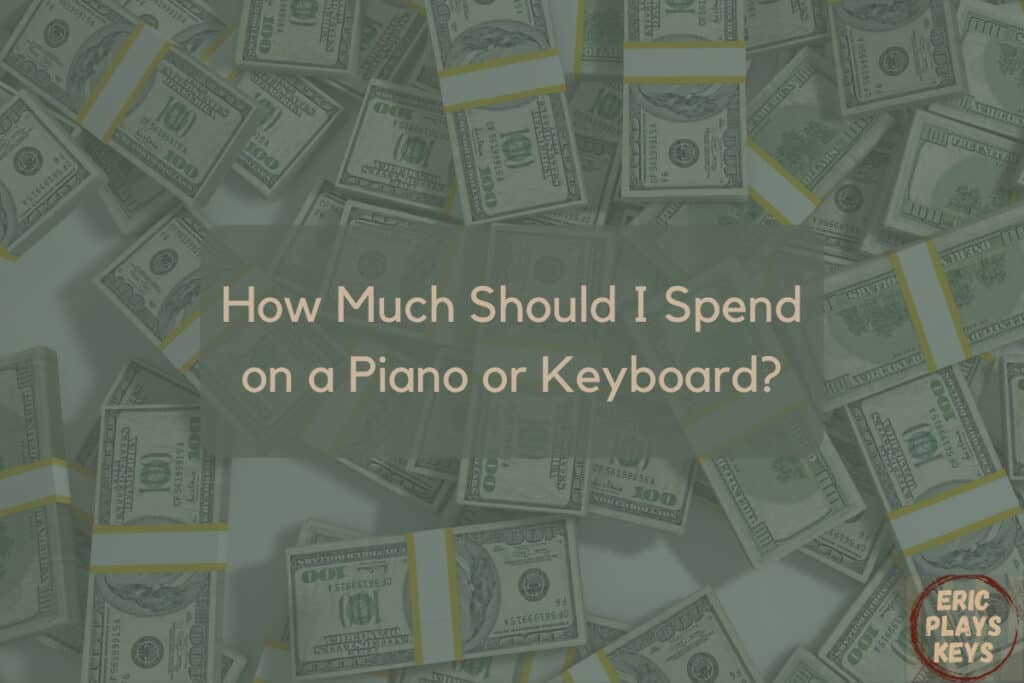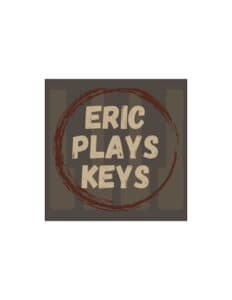
For many of us, a keyboard can be a significant purchase – which puts a lot of pressure on us to feel like we are making the right choice. Compounding this issue is the vast array of options, ranging from a couple hundred bucks to thousands of dollars. Fortunately, I’ve compiled some guidelines of topics for you to consider when deciding on your purchase.
Beginners should spend between $100-$1000, while advanced players may want to spend $1000-$5000+. Individuals requiring more features or nice aesthetics should consider spending more, while those who require regular instrument transport should spend less.
In this guide, I’m going to walk you through my recommended thought process and factors to consider before setting your budget and making your purchase. Happy shopping!
How to Determine Your Budget for a Piano or Keyboard
Without a doubt, your budget is the most important thing to consider when buying a keyboard. I recommend really defining how much you would like to spend before you start your browsing. This will help you avoid feelings of guilt if you overspend on a keyboard that you bought on impulse, and avoid feelings of disappointment if you underspend on a keyboard that doesn’t meet your needs. Here’s a few questions you should ask yourself before deciding on you budget:
How long I have been playing piano/keyboard?
- If this is a new or recent hobby for you, then you may be unsure of your level of commitment to continuing to play. There’s always exceptions – but I would recommend defining your budget on the lower end of the spectrum ($100-$1000) for now. It’s a win-win: If you end up moving on from playing, you didn’t lose too much money, and if you end up becoming more committed, you have more savings left over to upgrade.
- If you have been playing for many years and/or know that you’re really into playing, then I recommend spending as much as you can afford to. Personally, I subscribe to the idea that the absolute best use of our resources is to allocate them towards avenues that can really enrich your life. For this reason, if you really want that nice keyboard and you know you’ll make good use of it – spend the money! If you underspend, you’re shorting yourself of the best experience you could have. Or worse, you’ll realize you still need to upgrade, and end up spending the big money on top of what you’ve already spent!
Do I care about aesthetics?
- If you plan to perform, record video, or feature the piano or keyboard prominently in your living space – then it may be worth considering what the instrument looks like. For performing and recording video, there’s a certain element of professionalism and seriousness that comes with playing higher end models that boast elegant exteriors. In addition, a keyboard or piano can add an artsy touch to your living space – it can be thought of as furniture or a fancy appliance as well. If these criteria are important to you, I’d recommend spending the extra money to purchase an instrument that you love looking at!
- If you only plan to use the piano or keyboard for practice, or just don’t care – more power to you! There’s a lot of lower-priced keyboards and pianos with solid functionality that could be a great fit for you.
Do I need additional features (keyboards only)?
- If you want a large sound selection, lots of effects, and control – you can expect to spend more on these types of models, especially if you want high quality features on the keyboard.
- If all you want is a solid piano sound – again, more power to you! You’ll basically have your pick from the entire keyboard catalog from any seller, and can be very sure that every option will at least deliver a good and usable piano sound.
Do I need to transport the keyboard regularly?
- If you never intend to move the keyboard out of your living space, then you can feel more comfortable spending more money since you don’t need to worry about damages that could occur during transport.
- If you plan on transporting your keyboard for lessons, gigs, etc, then you may want to consider purchasing a cheaper keyboard for travel purposes. This way, you incur less risk if the board is damaged, and have additional budget to allocate towards a sturdy case.
How Much Does a Good Piano Keyboard Cost?
A good piano keyboard can cost anywhere between $1,000 – $5,000. For example, the Roland RD-88 is a solid option and costs $1,400. On the higher end, the Nord Stage 3 costs $4,700.
Of course, the definition of ‘good’ keyboard is subjective. I specified my range based on my experience and opinion, but many people may consider keyboards cheaper than $1,000 good as well. It all depends on what you’re looking for.
How Much Does a Piano Cost?
Pianos can cost between $1,000 and $100,000+, depending on whether the piano is an upright or grand, the manufacturer and model, and if the piano is new or used. Used upright pianos can fall closer to the $1,000 end, while the highest end concert grand pianos can be well over $100,000.
I know – this is a huge range of prices. For most people, I’d ignore the concert grand piano end of the spectrum, and focus on the $1,000-10,000 range. If you’re focusing on used pianos, the price can really depend on the seller and condition of the piano. Bargaining can also play a role here. We got a Young Chang baby grand piano for $4,000 several years ago, while new it goes for around $8,000. The piano we got was in decent condition, and we got it for a steal because the seller was very wealthy and was trying to get it out of the house quickly so he could upgrade. For new pianos, expect to spend more than $3,000 for a nice upright, and closer to the $5,000 to $10,000 range for a nice baby grand or decent grand. For the nicer grand pianos, I’d brace yourself for a purchase exceeding $10,000.
What Piano Keyboard Should I Buy for Beginners?
Beginners should consider the Yamaha P125, Roland FP-10, and Casio CDP-S100. These keyboards are simple, cheap, and provide high quality sounds and feel that enable beginners to enjoy playing.
I’ve played on these keyboards and similar ones throughout my jazz band days and at various jam sessions. They certainly get the job done, and you can’t ask for much more from your money. Beginners don’t need a bunch of fancy sounds or features, and the extra functionality that these keyboards do have aren’t very good. That being said, when it comes to what’s important (a good piano sound and a good feel), these three options deliver at a high level.
The thing to avoid when buying a cheap keyboard is to purchase something that you don’t end up liking. It would be a shame to hate the sound and feel of the keyboard you buy, and think that you just don’t like piano. Make sure to do your research before buying your first keyboard, especially if you’re considering other options.
I’ve compiled the best product reviews of these three keyboards for reference:
Yamaha P125
Roland FP-10
Casio CDP-S100
Is a Piano a Good Investment?
A piano is a good investment in yourself, but a bad investment financially. This is because pianos provide a great opportunity to improve yourself, but decrease in value over time. Individual preference for either self-development or finances will determine whether the investment is a net positive.
Being a musician myself, you could probably guess that I think a piano (or keyboard) is a good investment. This is because the joy I would get from owning and playing a piano is worth more to me than the money it would cost. That doesn’t mean I’m running to buy one right now, however. Pianos cannot usually be sold for more than the purchase price, and require costly and repeated piano tuning. Keyboards don’t require tuning of course, but can get damaged and definitely don’t increase in price. Overall, make sure to weigh your desire for musical development against the financial commitments you’re signing up for.
